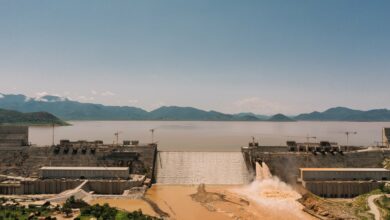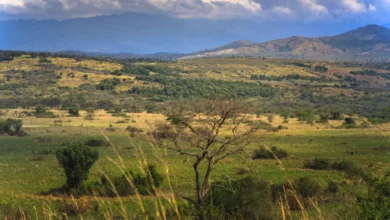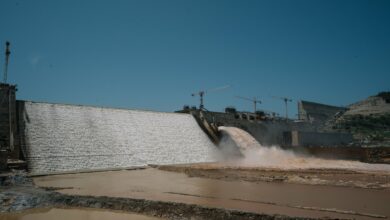The following is part II of Al-Masry Al-Youm's interview with Farouk al-Baz, research professor and director of the Center for Remote Sensing at Boston University, as part of our Green Profile series, in which prominent figures discuss pressing environmental issues.
Al Masry Al-Youm: In continuing our talk about the Nile Basin, of course you are familiar with current discussions on the effects from climate change leading to a sea level rise and what this means for the Nile delta. What do you believe to be the direction that Egypt should take in terms of adaptation and/or mitigation with regards to climate change?
Dr. Farouk al-Baz: I personally believe that Egypt should give attention to the Nile as a whole and to Africa by definition. We are the cornerstone of Africa but during the past half century we have forgotten about Africa. We should seek to be the number one country in this continent and we should be the big brother, where others would come to resolve problems. But this is not happening and we should certainly be giving more attention to Africa. In addition we have the Nile, and the Nile is our source of life. We should certainly be more aware with what is happening to the Nile in the south and make absolutely certain that the Nile riparian countries are following the schemes which are believed to be beneficial to everyone. We should be more forthcoming and helpful with their water regulation and utilizing their water resources because we are the big brother and we should not just look north and forget what is in the south.
Al-Masry Al-Youm: What’s your take on the most recent developments with five of the riparian state countries having signed an agreement seeking to reform Egypt's claim over the Nile waters?
Dr. Farouk al-Baz: The kind of agreement done recently is the kind of thing that should never happen. We should not be so out of the loop that we don’t even know that these countries are thinking of doing that. Before going ahead with something like this they should be coming to Egypt to discuss this and take our opinion on the matter and whether or not to go ahead with it. I really think this is the outcome of Egypt’s policy of the past in being forgetful that we are an African nation. We are the cornerstone of a whole continent and we should be the country that helps everybody in Africa and we should be the country that everybody in Africa comes to first.
Al-Masry Al-Youm: On a more local dimension, what would you argue to be the most important issues that should be the pillars of an environmental agenda for the Egyptian government?
Dr. Farouk al-Baz: Clean water is still number one and making certain that the rules and the regulations that were put by the Egyptian government during the past 25 years or so for protecting the Nile waters are abided by both here and by countries in the South. This is the number one priority for us. The Nile used to be worshiped by the Ancient Egyptians because they knew that this is life. Nowadays we should be respecting the Nile much more. If we looked at the Nile with care and respect we would not pollute it. So the government's job is to ensure that there are regulations so that both government and people deal with the Nile properly. Second is the fact that in most of our industries, both large and small, they are located in the middle of where people live. A large space needs to be designated in the desert, away from residential areas, to create an industrial zone to accommodate existing industries and those to come in the future. This would make sure the refuse of the factories is not directed towards humans or animals. A stretch of land 80km long and 20-30km wide was included in the Nile Development Corridor plan located north of the Fayoum depression which would be perfect for such a plan.
Al-Masry Al-Youm: As you know there is always a delay in actually implementing a policy agenda, during such a delay the role of the individual is very important in making change happen at a faster pace. What would you advise individuals in Egypt to start as actions towards environmental change?
Dr. Farouk al-Baz: I think the worst thing I see today in Egypt, which was not there before, is the fact that Egyptians are no longer so aware of environmental cleanliness. I see so much refuse in the streets. I see people throwing things in the streets with no care whatsoever. These are very bad practices, and I see them even amongst highly educated people. You wonder how people don’t care. This is part of basic human cleanliness, and human cleanliness is part of godliness. It is imprinted in all religions how cleanliness is next to godliness. Being a decent human-being means that you should keep your surroundings clean.
Al-Masry Al-Youm: Ending on a recent development, earlier this year the Farouk al-Baz Foundation for Development and Reconstruction was launched. Could you tell us more about the plans set forth for this organization?
Dr. Farouk al-Baz: I was not involved in this project in any way. This was totally generated by students and I was contacted and asked to be the president of this foundation but I told them that I would not be involved since the whole project is theirs. Thus, they should get the limelight and the accolades for it because this is their idea, their work and energy, and they should keep it as their own thing. All the things that I foresee for Egypt is for the younger generation. And why I think this is the case is because I believe that my generation has completely failed in doing anything good for the whole Arab nation. We failed totally. We failed on four basic things we were supposed to be trying to achieve even though we were a generation that had received fantastic education: first, we were to unite the Arab world, second, liberate Palestine, third, eradicate illiteracy and achieve social justice throughout the Arab world. And the reason for the total failure in all of them at any rate, is because we put all of our hopes in institutions. Arab unity was to be achieved through the Arab League, Palestine would be liberated via the armies, eradicating illiteracy was to take place through the Ministries of Education and achieving social justice was to be through the governments as well. But governments themselves were not capable of doing a thing. And in the process of thinking that these were to be achieved via institutions we elevated their positions and we forgot the individual. Individuals became pawns in the hands of institutions and therefore the individual had no voice. And so we have been killing the initiatives of individuals for the past 40-50 years because it has become all about the institutions.
Al-Masry Al-Youm: On that note, on the role of the individual and the power of the youth, we would like to thank you for your time.




